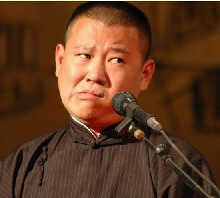"There is something 'hi-tech' about it," he said, adding, "Xiangsheng is in my blood. I'm full of gratitude to it, for all my other work benefits from it."
Thirty-three-year-old Guo belongs to the young generation who are more adaptable to their times. Today, the performances of his Deyun group have not only won acclaim from common fans, but have also attracted white-collar workers and people from cultural circles.
Busy as he is with various invitations, Guo still has many plans, such as opening his shows at universities, compiling a collection of traditional xiangsheng works, and putting on a play in the style of folk comedy dialogue.
"Modern people are often under much pressure, and need to relax," said Guo. "Everybody can speak, but why do you pay to listen to me? Because I can make you happy with my xiangsheng," Guo said.
 Old comedy stirs up new laughs
Old comedy stirs up new laughs
Comedians are attracting an increasing audience not only with low prices but also with their ingenuity in poking fun at everyday incidents. And if visitors happen to be in a taxi in North China's Tianjin from 5:30 to 6:30 pm, they will very likely be listening to a radio program called "Everyday Xiangsheng."
Xiangsheng is one of the best-liked forms of entertainment in North China, and "Everyday Xiangsheng" is among the most popular radio programs in Tianjin. "I tune in to the program every day," said taxi driver Liu Xingyi. "Listening to xiangsheng makes me relaxed, even when I work for long hours."
For Yin Xiaosheng, 68, lead performer with the popular Zhong You group in Tianjin, there was a time in the early 1990s when he thought his beloved traditional show was dying. The comic talk show, which appeared in teahouses in the late 19th century Beijing, was turned into a stage art as part of variety shows in theaters after New China was founded. The performers became theater artists, while the number of teahouses also dwindled, as the catering business was not encouraged.
Comic talks enjoyed some popularity in the late 1970s and early 1980s, but still as a part of TV or theater variety shows. And in the 1990s, "very few even talked about xiangsheng," Yin recalled, as many younger performers became TV hosts or played roles in short comic theatrical skits.
